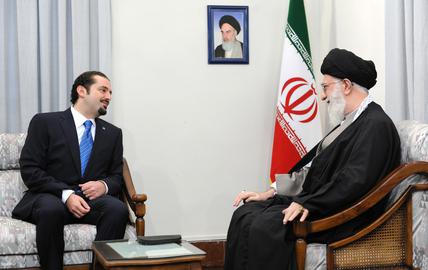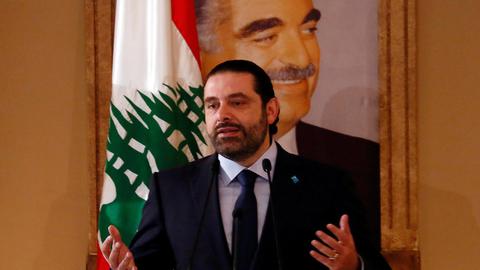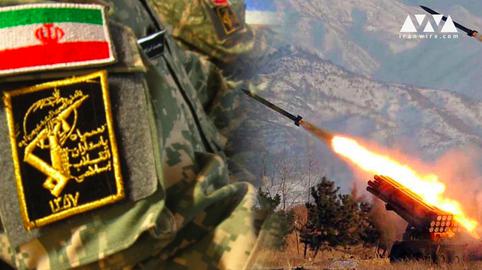Political instability is a distinguishing feature of Lebanon. There has been no shortage of political assassinations and no shortage of short-lived governments, one after the other. Now, following this pattern, Prime Minister Saad Hariri announced on November 4 that he was resigning after less than a year in office.
But this time, it’s different. According to a number of Arab commentators, Hariri’s resignation was not another typical twist in Lebanese politics. Instead, some have described it as “a declaration of war against Iran.”
In his televised resignation speech, delivered not from within Lebanon but from Saudi Arabia, Hariri said one of the reasons he was resigning was that he feared an assassination plot against him like the one that killed his father Rafik Hariri in 2005. "We are living in a climate similar to the atmosphere that prevailed before the assassination of martyr Rafik al-Hariri," he said from the Saudi capital Riyadh. He also directly attacked Iran. “I want to tell Iran and its followers that they are losing in their interferences in the affairs of Arab nations,” he said. “Our nation will rise just as it did before, and the hands that will harm it will be cut.” It was these comments that prompted some Arab analysts, including one from Al-Manar, the Hezbollah-affiliated television network, to describe his speech as “Saudi’s declaration of war against Iran.” Many people went on Twitter to say the same, according to BBC Arabic.
Through Hezbollah, said Hariri, Iran has created “a state within a state” in Lebanon. He accused Iran of sowing “sedition, devastation and destruction” in any place it gets its hands on.
The claim of an assassination plot has the potential to pressure Saudi Arabia into taking action to protect Hariri’s life. Saad Hariri was born and raised in Saudi Arabia and is a Saudi-Lebanese dual national, so the Saudi government would consider any threat against his life as a threat against a Saudi citizen. For Saudi Arabia, Saad Hariri has assumed the same role in Lebanon that Hassan Nasrallah, head of the Lebanese Hezbollah, plays for Iran.
And he emphasized that he was talking not only about the Lebanese Hezbollah, but about all Iran’s allies, from Lebanon and Syria to Iraq, Bahrain and Yemen. This could be a signal that Saudi Arabia is preparing for a broader confrontation with Iran in Lebanon and, most likely, elsewhere.
Saad Hariri had resigned once before, in 2011. At that time, he accused Hezbollah of sabotaging his government, but he did not attack Iran with such rancor, and he was not speaking from within Saudi Arabia.
The timing of Hariri’s resignation is and speech is significant, coming one day after Ali Akbar Velayati, Ayatollah Khamenei’s senior advisor in international affairs, met with Hariri in Beirut. Did Velayati deliver a message to Hariri that led him to fear for his life so much he felt compelled to leave Lebanon and announce his resignation in Saudi Arabia to demonstrate that he had the support of the Saudis? What kind of menacing message could have made the prime minister feel he had no choice but to resign and to threaten to “cut the hands” of Iranian allies in the region?
Since the Lebanese Hezbollah entered the Syrian civil war to support Bashar al-Assad, Saudi Arabia has responded by increasing its pressures to get rid of Assad in equal measures — and Hezbollah has borne the brunt of this pressure. With the sponsorship of Riyadh, four regional groupings — the Gulf Cooperation Council, the Arab League, the Arab Parliament and the Organization of Islamic Cooperation — have put Hezbollah on their list of terrorist groups.
Hezbollah “Shining Like a Sun”
The Saudi response in Syria enraged Ayatollah Khamenei in the extreme. “Hezbollah is showing its magnificent stature in the world of Islam,” he said in a speech on April 20, 2016. “Let us assume that such and such a dependent, corrupt, hollow and empty government [meaning Saudi Arabia] condemns Hezbollah in such and such a manifesto [by the Organization of Islamic Cooperation] and with its money and oil revenues. Well, the hell they do that! Who cares? Over there, Hezbollah is shining like a sun! Hezbollah is a source of pride for the world of Islam! The youth and members of Hezbollah of Lebanon are a source of pride for the world of Islam!”
But, in December 2015, the United States Congress delivered a heavy blow to Hezbollah, passing a bill that named 100 entities and Hezbollah-associated groups and individuals on its sanctions list. The bill, the Hezbollah International Financing Prevention Act of 2015, threatened sanctions against any bank in Lebanon, including its Central Bank, if it knowingly did business with entities that facilitate Hezbollah’s activities.
This long list included high-level Hezbollah officials, including Hassan Nasrallah, two members of the Lebanese parliament and companies and institutions including Al-Manar television network, Al-Nour Radio and Al Rasoul Azam Hospital in Beirut. And in October 2017, the US State Department offered a total of $12 million for information leading to the arrest of Talal Hamiyah, head of Hezbollah’s foreign operations, and Fuad Shukr, a top Hezbollah military operative.
The US clearly needs the government of Lebanon to enforce banking pressure on Hezbollah, and to hunt high-level Hezbollah operatives. And, more than anybody else, it is the job of the prime minister to carry out these actions. Refusing to cooperate with the US is not something Saad Hariri would contemplate because, first of all, he is an ally of Saudi Arabia and, second, he believes that his father was assassinated by Hezbollah.
Turning the Table
The message — or request — Velayati had for Hariri was likely to be a demand that he shield Hezbollah from such financial pressures. Fulfilling such a request would go against both Hariri's official duties as prime minister and his own beliefs and convictions. And he probably concluded that refusing this request put him in danger of meeting the same fate as his father. Perhaps he was also aware that his government would soon fall when his Hezbollah cabinet ministers resigned. So the only option left for him was to tender his own resignation. This way, US pressures and sanctions can go on unimpeded and, at the same time, he will be the one who, by dissolving his cabinet and delivering a fiery speech, would turn the table on Hezbollah and increase pressures on the group and its Iranian backers — instead of the other way around.
Now that Hezbollah has been directly and publicly targeted by a force inside its own country, it is quite possible that predictions of new flare-ups in Lebanon and in the Middle East are not far off the mark.
And at least the Islamic Republic tends to agree. "Hariri's resignation was done with planning by Donald Trump and Mohammed bin Salman, the Crown Prince of Saudi Arabia," said Hussein Sheikh al-Islam, adviser to Ayatollah Ali Khamenei, on November 5. And Iranian foreign ministry spokesman Bahram Ghasemi said Saad Hariri's departure was designed to create tensions in Lebanon and the region. He said that Hariri had repeated “unrealistic and unfounded accusations" and had aligned himself with "those who want ill for the region” — meaning Israel, Saudi Arabia and the US.
visit the accountability section
In this section of Iran Wire, you can contact the officials and launch your campaign for various problems


























comments